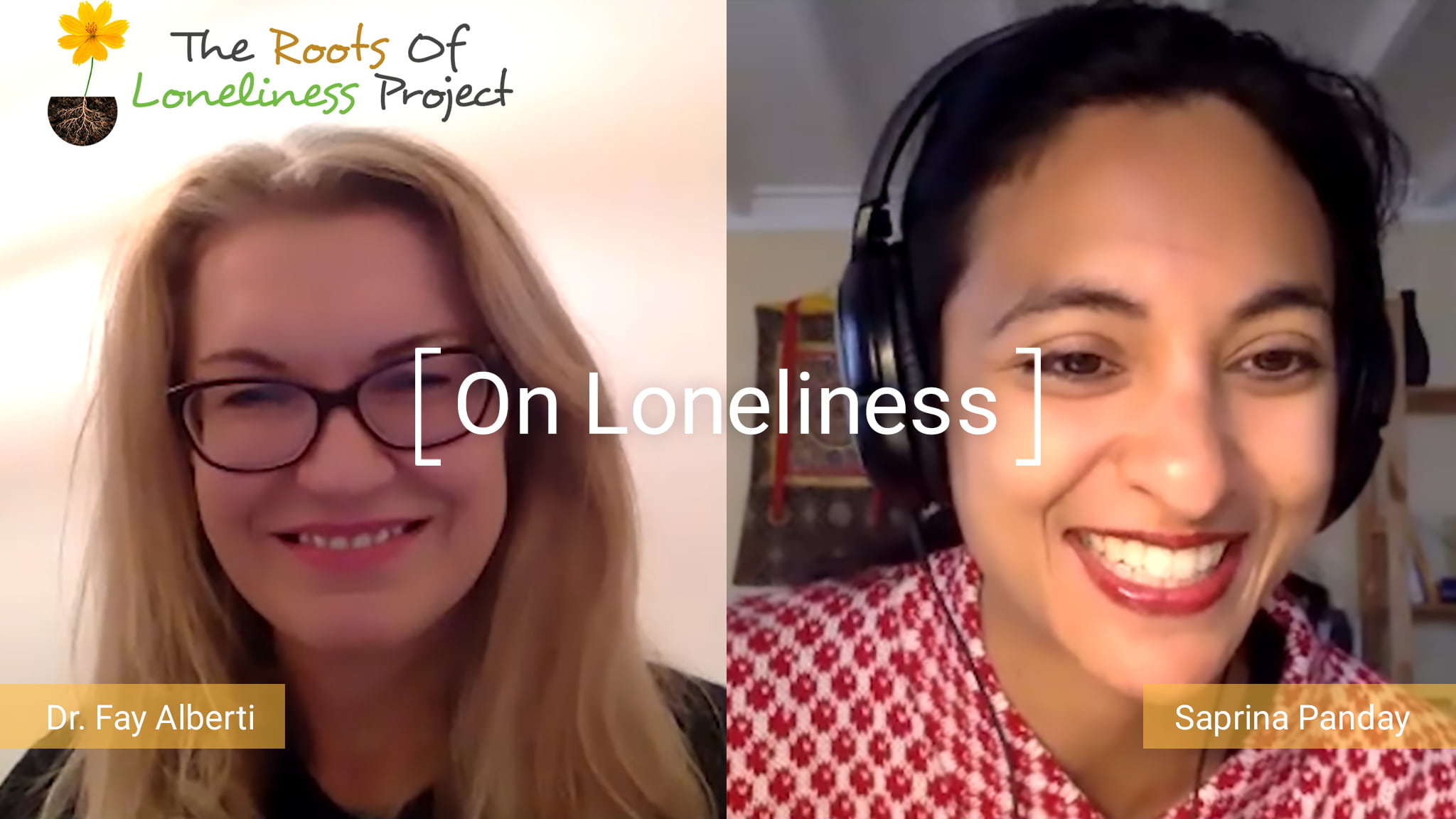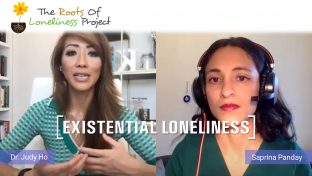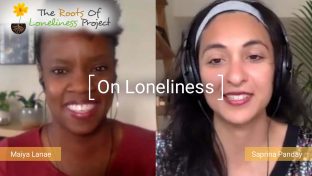The Origins & Culture Of Loneliness And Its Effects On Community

I’m not supposed to be lonely.
I have everything I ever wanted — very close friends and family, many career options — and to top it off, I’ve found the love of my life. Whenever I feel down I know there are people I can reach out to.
Yet, like many of you, I still feel…lonely.
And perhaps the reality of modern life is that, in some form or other, we ALL do.
In 2017, former U.S. Surgeon General Vivek Murthy called loneliness an epidemic.
The following year, the UK appointed its first Minister for Loneliness.
As harmful to our health as smoking 15 cigarettes a day, loneliness affects millions of people across socio-economic groups and cultures, from millennials to the elderly.
So what does this tell us about the world we inhabit — about ourselves and each other? And what can, or should, we do about it?
All of these questions are explored in our new series: “On Loneliness: A Video Series About Coping With Feeling Lonely” created by The Roots Of Loneliness Project.
Editor’s Note: This article is a transcript from “On Loneliness: A Video Series About Coping With Feeling Lonely.” The interview has been edited for length and clarity.
This video is part of our ongoing series The Roots Of Loneliness Project, the first-of-its-kind resource that comprehensively explores the phenomenon of loneliness and over 100 types that we might experience over the course of our lives.
Loneliness Is An Emotional Need That Isn’t Being Met
Dr. Bound Alberti Intro: So I think you need to be careful about loneliness that’s enforced and loneliness that’s chosen, being quite different things, and I think that there are ways that we can address loneliness when it’s not chosen.
But that means really targeting individual communities, thinking about what belonging means, thinking about how we can use the whole body to bring people back into a sense of awareness and belonging in the world in much more nuanced ways than we do at the moment.
Saprina Intro: Dr. Fay Bound Alberti is a reader in history and U.K. Research and Innovation future leaders fellow at the University of York.
She has published widely on the histories of emotion, the body, gender, and medicine, and her most recent book, “A Biography of Loneliness: The History of an Emotion” by Oxford University Press is now out.
Saprina: Welcome Dr. Bound Alberti.
Thank you so much for being with us today to talk about this very sensitive topic of loneliness. I’d love to hear about why in your view we feel lonely?
Dr. Bound Alberti: I think that loneliness needs to be understood most significantly as a conscious lack of an emotional need that isn’t being met.
Loneliness changes through history, and it’s felt by people very differently according to their circumstances.
But what unites it is a conscious sense of a need not met, and that tends to be a lack of belonging, a lack of community, a feeling that you don’t fit in.
So that’s at the heart of most discussions of loneliness.
Saprina: Is it more of a mental state then?
Dr. Bound Alberti: I think that it’s wrong to view loneliness as a mental state.
I think that’s how it’s viewed in the West and in the modern age, because we’ve got some sense of emotions belonging to our minds or our brains more specifically.
But actually loneliness is a whole-body experience — we feel it in our bodies.
And loneliness is also not just one thing, it’s made up of lots of different emotions.
So the image that we see most commonly on TV, on the news, is of a little old lady sitting at home waiting for a casserole to be delivered.
It’s an idea that people are feeling lonely, and they just need people to reach out and be with them.
But the reality is that loneliness is much more complex than that.
Some people who are lonely feel angry, resentful, or jealous, some people feel sad, and that changes according to the nature of the loneliness and that person’s individual circumstance.
So one of the challenges in talking about loneliness as this thing to be addressed, or as this epidemic, or however we conceive it, is ignoring those specificities, and if we ignore those specificities, we can’t really address it.
The Language And History Of Loneliness In The West
Saprina: I guess in my life, I’ve always thought of it as one thing, but it’s true that it’s so complex. So, could you talk a bit about the history of loneliness in the West?
Dr. Bound Alberti: The interesting thing about the history of loneliness in the West is it doesn’t really come into being as a language until about 1800.
Before that, people would talk about being “onely,” but that meant simply being on their own.
If they used the term lonely, they simply meant separate from other people physically, so you’d have a lonely tree or a lonely walk or a lonely cottage.
You wouldn’t have the sense of emotional lack that goes with it, it would simply be the same as what we would call solitude now, just being by yourself.
And so the emergence of a language of loneliness from about 1800 comes into being partly because loneliness becomes reconceived of as a mental thing and a mental problem.
Partly because there’s a decline in the belief of God, there’s a decline in community and traditional ways of being together, and there’s much more focus on the individual.
So we have the rise of things like existential philosophy that separate people from others and say and talk about the sort of angst of not fitting in.
Lots of different things are happening at once to change society and politics and medicine and culture that create this new language of loneliness that is apparently so endemic today in the West.
Saprina: So is it a Western concept?
Dr. Bound Alberti: I think that it is a Western concept.
One of the problems that we have in understanding loneliness as a global phenomenon is there’s very little work being done comparatively, so my suspicion is that it tends to develop the same sort of time in the 19th century in societies that are post-industrial, and it’s linked to ideas about the individual and the decline of community.
What we really need to do is to study it cross-culturally and in different communities, and that work is still not being done, so it’s very hard to make decisions or assumptions about the natural state of loneliness, if you like, if we’re only focusing on a very narrow part of the planet.
The Role Of Culture In Loneliness And How It’s Perceived
Saprina: That’s extremely fascinating, and as much as there’s a limitation on what we know, do you think that culture has a big role to play in loneliness that we can use culture as a way to help us or address it?
Dr. Bound Alberti: Do you mean culture in terms of…?
Saprina: I guess I’m thinking more of culture in terms of from a non-Western perspective, really, I’m thinking culture like South Asian cultures which are very community-oriented.
Do you think that there is something from those places that would allow us to [look at loneliness differently], just as a hypothesis of this point?
Dr. Bound Alberti: For sure. I think the breakdown of the sense of community by which people used to take responsibility for others and feel that the fate of others was important, that’s something — it’s very characteristic of modern society — and what we have in the modern West is this breakdown of relationships and a very fractured way of living.
If you think about what’s happening in the U.K., around Brexit, or the U.S. around Drumpf’s presidency, we’ve got a very fractured society that is polarized, and people are encouraged to be competitive and to fight against one another.
There’s very little sense of actually belonging to some wider sense of community, and it tends to be the case that work patterns mean that we separate ourselves off from our families and our friends, and relationships tend to be very transient because of the way urbanization works, that we move around.
So there’s a physical change that’s happening, but there’s also a psychological change whereby we are not encouraged to think about community and being accountable for other people in the way that perhaps we once did.
Saprina: Since loneliness feels like something that’s very taboo, a lot of people don’t talk about it.
Do you feel like there’s a different way that different communities perhaps, or different people — like people from different cultures — treat loneliness, or react to it?
Dr. Bound Alberti: Yeah. I think this question about taboo is very, very important because it’s covered in shame, and that is also a Western thing.
The idea is that we’re supposed to be individual and we’re supposed to look after ourselves, and we’re supposed to — above anything else — be self-sufficient, and to be gregarious, and to be outgoing.
So people who don’t feel that and people who are solitary, and people who choose to be solitary, and people who are introverted, tend not to fit into that model.
And there’s also this presumption that if you are lonely, there’s something wrong with you, so you tend to kind of shy away from discussing it.
It’s fantastic that we’re talking a lot more in the West about loneliness, although there’s not very many solutions being offered, partly because we’re not being very nuanced about it.
I think that talking about an “epidemic of loneliness” is problematic because it makes people worried about loneliness.
There’s a difference between transient loneliness and chronic loneliness.
Chronic loneliness is when you have it for many years, and it’s associated often with a number of physical illnesses and it tends to affect people who are socially isolated and would like to be around other people that are not.
And then there’s transient loneliness which we pass through many times in our lives when we’re going through different stages of our lives.
That might be starting university, or becoming a mother, or getting married, or any of the rites of passage that we go through in our lives, and sometimes loneliness is bound to accompany that because it’s a transition from one stage to another.
I don’t think we’re very good in the West at recognizing that those emotions, and those changes, are a natural part of the order of things.
If we’re fearful of them, and we avoid them, then it actually does stop personal growth and it makes us fearful of something that’s very natural.
Saprina: Can you tell us a bit about your history with loneliness?
Dr. Bound Alberti: Yes. I was quite lonely as a child.
I did experience loneliness as a child because we lived in the middle of nowhere in Wales, and we were very isolated.
So, my response to this was to spend a lot of time making up stories and going for long walks, and finding ways through creativity of actually enjoying being lonely.
One of the things I talk about in my book is loneliness can be, for some people, a really positive experience because it’s connected to creativity and it’s connected to a sense of, I don’t know, finding time for thinking about the world and your purpose in it.
And so I think, in much the same way as we get worried about kids being bored, we get worried about kids being lonely, but maybe it’s not always bad.
How Can We Address Loneliness Culturally And Socially?
Saprina: I completely identify with that. I’ve used loneliness for everything I’ve ever done. So, in your view, should we be trying to get rid of loneliness at all?
Dr. Bound Alberti: I think it depends on the kind of loneliness.
Because some kinds of loneliness, when they are unwanted, when they are produced by social isolation or by a lack of ability or a lack of access, then loneliness can become very detrimental to people’s mental and physical health.
Sometimes loneliness is just a life stage. Sometimes it’s something that’s chosen.
So I think we need to be careful about loneliness that’s forced and loneliness that’s chosen being quite different things, and I think that there are ways that we can address loneliness when it’s not chosen.
But that means really targeting individual communities, thinking about what belonging means, thinking about how we can use the whole body to bring people back into a sense of awareness and belonging in the world in much more nuanced ways than we do at the moment.
Saprina: And could you share some tips on how could we create belonging or how can we create, even just the beginning of that?
Dr. Bound Alberti: Some of the most interesting things that I’ve seen develop are around the “Men in Sheds” movement that get men working together on something, or Age UK Doncaster, when you have circles of independence, so you mentor people, and we partner them up with people who have similar interests.
Because the evidence seems to be that if we do things physically, if we work together with other people, it produces some sort of sense of belonging in a way that doesn’t happen when everything is about talking, or spending time with people because they happen to be the same age as you.
There’s something about identifying what a person’s interests and activities are.
And also, it seems to be the case that getting people out into the countryside can help — bringing them back to a sense of nature and belonging — because in a sense, that’s another way of being and belonging in the world is to have access to the natural world.
Most of the techniques that I think seem to make a difference, the focus on the body and the body in the world — so I think that’s something to think about — which is why I’m quite averse to the idea of a “loneliness peril,” which is coming into existence, apparently, because that’s a way of medicalizing loneliness.
I’m not saying for a moment that some people don’t suffer.
Of course people suffer, but the reasons are generally social and to do with the way that they live rather than some innate predisposition to loneliness.
So taking the mind and body interaction approach, I think is the way ahead.
- City Living May Exacerbate Modern Loneliness
Saprina: I just wonder, do you feel that cities by their very nature will be lonely? Because there’s just so many people and everybody’s come from different places?
Dr. Bound Alberti: It seems to be ironic really doesn’t it? That even in the midst of a great crowd of people, we can feel lonelier than when we’re on our own.
I think city living is an illustration of that, particularly when we live in ways that are very crowded, where we live a long way from where we work, so it prevents us from creating any sense of community and often we just don’t know our neighbors.
So all of those things certainly act against community in the urban context.
I think it’s important to remember though, that in the rural context there will be different kinds of ways of being lonely, which are about disconnection and about absence from services, and those sorts of things.
I do think there’s something quite specific and different about urban loneliness.
The writer Olivia Lang did a wonderful book about loneliness in the modern city, and there’s something quite profound I think about being able to see when you look out of a tower block at night, being able to see all these different people that are living alongside you but actually being separated from them in a way that is quite profound.
- The Impact Of Social Media On Loneliness
Saprina: And in your view does social media, because there’s this huge debate, of course, that social media promotes loneliness. What do you think about that?
Dr. Bound Alberti: I think that social media works in the same way that other forms of social communication work.
We’ve had anxieties about every form of technology that’s been invented.
When the telephone was invented, people said, “Oh, that will prevent people from talking in real life. It’s very bad for relationships.” I think the reality is that some people who are lonely find it a lifeline because they’re able to interact with other people.
There’s no doubt that spending too much time on social media only is a problem because the studies seem to show that those people who spend time only talking to people online, those are the ones that are lonely.
It’s when you can get the balance right between offline and online relationships, that seems to be what makes the difference.
I think it’s wrongheaded to say, “Oh, to hell with this terrible thing,” and “We should do away with it,” it’s not realistic, is it?
And that’s not how people do live with these technologies, particularly the younger generation, that’s how they communicate.
So we have to find ways of regulating, ways of making things healthy, ways of bringing them into a new way of thinking about community, because what is it that online communities are giving us that offline communities aren’t?
Maybe there’s a way of threading these together and working out really how social media can be a force for good in people’s lives, particularly those that are lonely.
- Corporate Culture Should Focus On Improving Human Connection
Saprina: Can you also just advise on how companies can create a culture of belonging? Because a lot of times people just don’t feel connected to each other at work.
Dr. Bound Alberti: This is true, and I had an interesting conversation about that at work today myself really, where there is a sense of a culture of an organization.
But as you say, many people living and working around that do feel disconnected.
Certainly it is the responsibility, I think, of companies to recognize this as part of employee well-being, in the same way that I think it’s part of governments to recognize this in terms of social well-being.
We need a much broader concept of well-being that does take into account ideas about community, our sense of belonging, our sense of fit, so that we’re not feeling quite so disconnected.
It shouldn’t be that we just go off to work and then we come home and there’s no actual life balance.
We need to find a way as developed countries that should be able to find a way of creating a space for a more happy existence.
Saprina: But would you say that is a kind of a modern challenge now to create that space because we’ve never had to in the past?
Dr. Bound Alberti: I think that’s a very interesting problem because, at the moment, the way that we’re looking at loneliness or well-being, or mental health, or any of these really problematic concepts, we’re thinking about them as very individual things.
We’re not thinking about how the way that we live and our philosophical beliefs and our economic and social structures help produce those kinds of emotional states.
Until we’re prepared to step back and look at the big picture and think, “What is it about how we are creating life that’s causing all this social alienation and unhappiness?”, then I don’t know what sort of piecemeal things are going to make that much difference.
Treating Loneliness: A Unified Societal Approach And A Return To “Community”
Saprina: In all of your research, who are the people that are particularly taking it on [loneliness] and trying to apply it in their lives?
Dr. Bound Alberti: Different charitable organizations are trying to make a change in how we do things, but what I haven’t seen at the moment is the medical profession acknowledging how much we think about the lonely body.
In terms of social prescribing — where people are being prescribed dance lessons or being prescribed activities — this hints at the possibility of a different way of treating loneliness.
But the problem is that the measures that are in place at the moment, they’re not really being evaluated, there’s no way of knowing if they’re working, and they’re often being given as an alternative to having a rigorous joint medical response.
So we do need to find ways of helping doctors and helping people who are caring for mental health, or thinking of a whole-body approach, that might make a difference.
But this connects to what I was saying earlier about the need for societies as a whole to take responsibility for other people and to sort of take the sense of community quite seriously.
We talk about the term community all the time, just as we do loneliness, but nobody really thinks about what that means and what that might look like.
Saprina: Can you offer some tips on what that might look like?
Dr. Bound Alberti: Well, I think it looks like different things to different people, and this takes us back to how loneliness is variable.
In order to understand how individuals feel, we have to appreciate the different ways that loneliness manifests itself and think, for example, about young people going to university, think about setting up resources for them that allow them to think about self-care, that allow them to think about their bodies as well as their minds and make connections that are enduring.
Because one of the things I found in my research is that if you are lonely as a child, you’re much more likely to be lonely in later life.
So, this suggests that we need to start thinking about those interventions at a much earlier stage. It’s almost like we get a way of coping or a way of dealing with loneliness at a young age that we then perpetuate through our lives.
Saprina: And there’s this idea that loneliness — I don’t know if it’s an idea or if it’s a scientific fact — is hereditary, is that the case?
Dr. Bound Alberti: Yeah, I find that a bit of a challenging concept, because, in the same way that the predisposition to depression might be hereditary, I can understand that people would think that perhaps loneliness is hereditary.
But really, when you think about it, if you’re a child experiencing a parent who is lonely, you’re very likely to pick up the same coping mechanisms and have the same attitude to the outside world as that parent.
So, I think epigenetics are as important as genetics here, and it’s the ways in which those genes become realized because of the way we live, that maybe we need to think a little bit more about.
I mean, certainly, the social influences seem to be far more important than the genetic ones.
Saprina: Fantastic. Well, thank you so much Dr. Bound Alberti. I really appreciate — this was such a great conversation — and I really look forward to reading your book.
Dr. Bound Alberti: Thanks very much. It’s a real pleasure to talk to you.
Editor’s Note: This article is part of The Roots Of Loneliness Project, the first-of-its-kind resource that comprehensively explores the phenomenon of loneliness and over 100 types we might experience during our lives.
Find Help Now
If you’re struggling with community loneliness, we’ve put together resources to meet you wherever you are — whether you want someone to talk to right now, or are looking for longer-term ways to help ease your loneliness.
- Suicide Prevention Lifeline: 1-800-273-TALK (8255); Deaf or hard of hearing dial 711 before the number or connect via online chat
- Resources & Emotional Support For Loneliness
- Volunteer & Pet Adoption Opportunities






